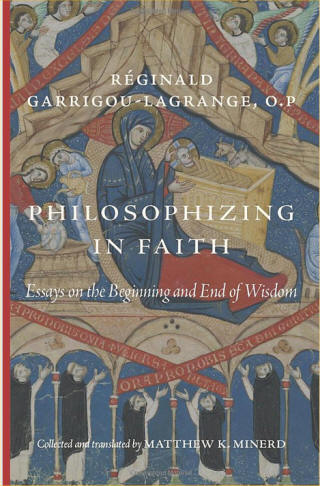Catholic Medical Quarterly Volume 72(1) February 2022
Book Review
Philosophizing in Faith:
Essays on the Beginning and End of Wisdom
by Reginald Garrigou-Lagrange O.P. Cluny Media
Reviewed by Dr
Pravin Thavasathan
 Reginald
Garrigou-Lagrange was one of the greatest Catholic theologians of the
twentieth century. It is said that he was the author of Human Generis,
the encyclical of Pius XII that condemned Neo-modernism. The splendid
essays in this book have been translated into English for the first time.
Reginald
Garrigou-Lagrange was one of the greatest Catholic theologians of the
twentieth century. It is said that he was the author of Human Generis,
the encyclical of Pius XII that condemned Neo-modernism. The splendid
essays in this book have been translated into English for the first time.
The essay on Modernism, a heresy that is afflicting the Church currently at all levels, is brilliant. Modernism, says Garrigou, ultimately identifies faith with religious sentiment. Newman said the same thing about the liberalism of his age. And so many Catholic moral theologians are saying the same thing today: if it feels right, do it as long as it doesn't hurt anyone. There is a total rejection of the supernatural. The philosophical foundation of Modernism lies in agnosticism.
For the Modernist, says Garrigou, faith is not something revealed by God. It is a religious experience. Faith thus becomes nothing more than an exercise in subjectivism. Faith is also subject to change and even defined dogma is subject to change as other disciplines such as science advances.
Garrigou convincingly argues that the Modernist has fallen under the spell of Hume's scepticism. Another important chapter asks the question: is the state subordinated to the protection of the rights of the individual, or are individuals subordi-nate to the state? For Garrigou, society, far from resulting from a social contract, is posited by the very nature of man who without assistance from his fellow-men is unable to exercise his own activ-ity as a rational being. In contrast, we have Hegel who said that the individual is subordinate to the state. The Hegelian state is established in the place of God. The rights of the state become the rights of God. All the Marxists had to do was to get rid of God. The Church, says Garrigou, has responded to these errors since the nineteenth century. Pius IX condemned them in his Syllabus of Errors. The Catholic philosopher Donaso Cortes wrote about the dangers of liberalism and predicted the advancement of Communism. Interestingly, Pius IX condemned the proposition that the rights of parents to educate their children is subservient to the right of the state to do so. Christians, says Garrigou, affirm the dignity of the common good. We affirm the dignity of the human person, much more than Kant ever did, because we believe that man is made in the image of God. All this is an affirmation of the teaching of Thomas Aquinas.
Garrigou writes that attempting to synthesise Hegel and Aquinas is like adding sulphuric acid into excellent wine! If only Rahner had listened. Garrigou also quotes from a book entitled The Kantian Poison.
Garrigou quotes Aquinas as saying that suicide is contrary to the common good. He concludes the chapter by stating that the state is subordinated to the intellectual, moral and spiritual perfection of the human person.
Garrigou-Lagrange was a great Catholic theologian, as this book demonstrates so well
